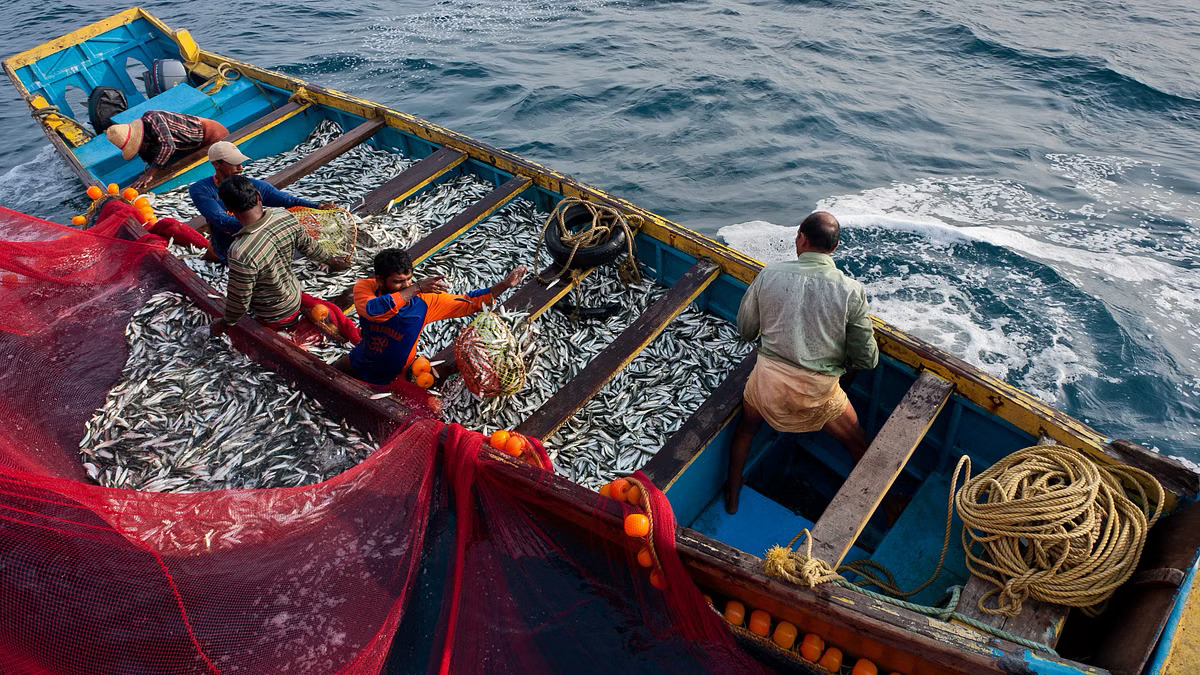Ernakulam (Kerala) [India]: In a bid to address the looming threat of climate change on fisheries, India has proposed a substantial reduction of the carbon footprint as a significant step towards climate-resilient fisheries.
This was suggested at the first session of the Sub-Committee on Fisheries Management under the Committee on Fisheries (COFI) of the Food and Agriculture Organisation of the United Nations (FAO).
India’s statement on climate-resilient fishing was presented to the global body by the ICAR-Central Marine Fisheries Research Institute (CMFRI), Kochi. The Indian delegation was led by J Balaji, former Joint Secretary, Department of Fisheries, Ministry of Fisheries, Animal Husbandry and Dairying, Government of India.
Carbon emissions per kg of fish caught in India’s marine fisheries are 17.7 per cent less than the global average according to a recent study, said India.
It maintained that, in terms of climate change, India falls into the medium-to-high category considering the overall impact by 2050. J Jayasankar, Head of Fishery Resources Assessment, Economics and Extension Division of CMFRI, read out the statement, highlighting India’s proactive stance on tackling the climate crisis in the fisheries sector.
The meeting, held virtually from FAO, Rome, was attended by members of the FAO Committee on Fisheries (COFI) plus one member organisation, representatives from three specialised agencies of the United Nations, observers from other FAO member nations and observers from intergovernmental and international non-governmental organisations.
Apart from CMFRI, officials from the Department of Fisheries, Govt of India and the Fishery Survey of India were also part of the Indian delegation. Dr Balaji was elected as the First Vice-Chairperson of the incoming Bureau of the Sub-Committee, which serves as a forum for consultation and discussion on fisheries management, associated technical and policy issues, and the related work performed by FAO.
“A big step towards climate-resilient fisheries is harnessing the carbon sequestration potential of seaweeds to mitigate climate change impacts. Enhancing natural habitats for improving seaweed resources, expanding seaweed culture systems and enhancing mangrove ecosystems may help lay the path for better carbon sequestration,” India’s statement said.
The country urged global and regional bodies to integrate the Intergovernmental Panel on Climate Change (IPCC) prediction with macro-indicators such as habitat upheaval, resource stress and market orientation.
This integration, India suggests, would enable member nations to incorporate insights into regulations, adaptations and integrated managerial strategies on a dynamic basis.
The statement further said: “India suggests that FAO may plan to schedule capacity-building exercises in mitigating emissions of greenhouse gases in capture fisheries and aquaculture; spatial planning; cross-sectoral planning; adaptive fisheries management; strengthening resilience; safety at sea; rehabilitating ecosystems; and stronger farming structures. India also requests member countries to share the best, scalable, and reproducible solutions and suggests that FAO may chronicle them for the common benefit of the community of nations.”
CMFRI also presented India’s statement on Mainstreaming Biodiversity in Marine Fisheries Management at the meeting. This demanded the interlinking of reports on habitat mapping and valuation, fishery and assessment of both the stocks of targeted resources as well as those like marine mammals and migratory species to develop regional indicators. Shoba Joe Kizhakudan, Head of the Finfish Fisheries Division of CMFRI, read out this statement at the meeting.
It pointed out that promoting more marine protected areas (MPAs) to match the requirements of the Sustainable Development Goals (SDGs) and initiatives like artificial reefs at suitable locations along the coastal stretch of the country add to India’s efforts to bring biodiversity to centre stage by keeping the livelihoods of traditional fishermen unaffected.
India informed the gathering that fishermen in the country are well aware of the role of biodiversity, as is quite evident from the increasing reports of the rescue of entangled marine mammals and sea turtles.
“Considering the goals of the Global Biodiversity Framework (GBF), India recognises that the key indicators of interest would be metrics like health indices of ecosystems and the proportion of MPAs.
India welcomes and supports FAO initiatives to provide guidance on mainstreaming biodiversity in fisheries management across regions and actions to reduce threats to biodiversity. India also encourages FAO to act on the fourth goal of the GBF viz funding gap, for multilateral unified actions across regions with a focus on halting and reversing biodiversity loss while respecting the interests of the fisheries sectors,” the statement said.
“Indian authorities are also reaching out to stakeholders in a big way to inform the importance of compliance with international conservation instruments like CITES. The country’s own Wildlife Protection Act serves as the main binding legal instrument that ensures conservation of biodiversity,” India’s statement said.

